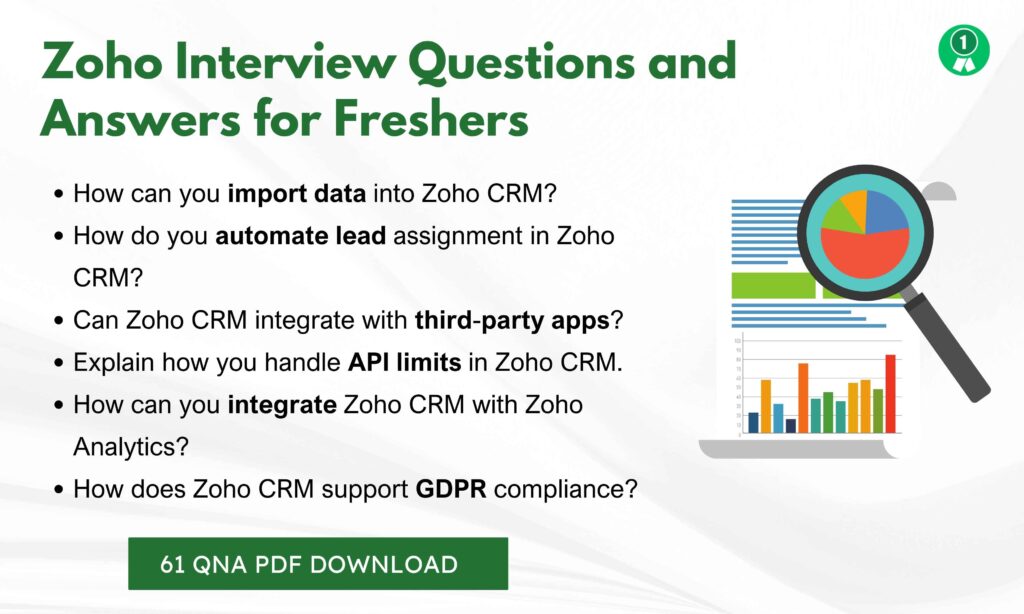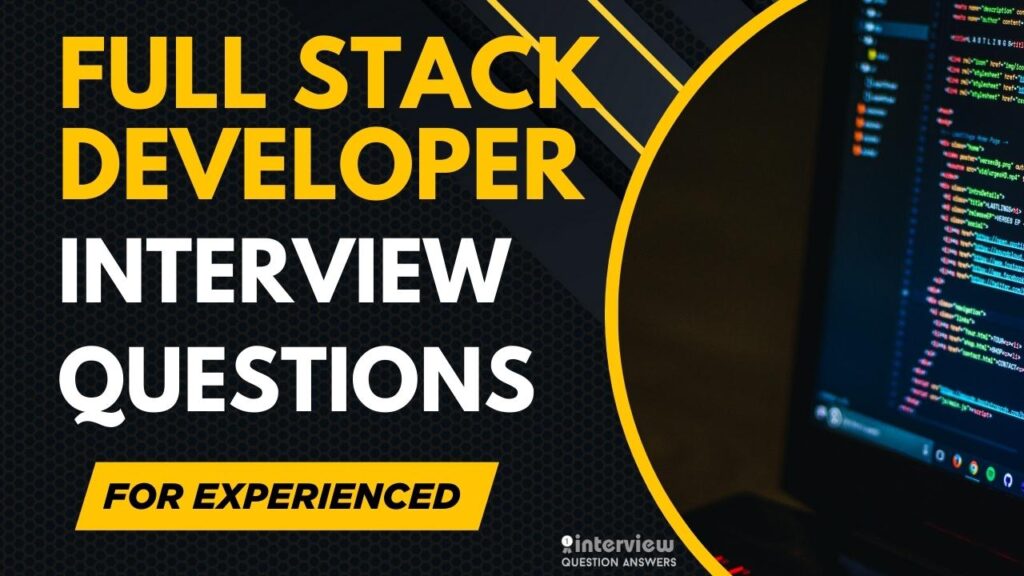We shared various Zoho interview questions and answers designed to help candidates prepare for different roles like Software Developer and Technical Support Engineer. This guide covers freshers and experienced professionals, including advanced technical questions, problem solving examples.
We have included important Zoho CRM questions, Deluge scripting, REST APIs, error handling, system integrations, customer support approaches, and logical reasoning problems, all structured semantically to make learning simple and organized. Whether you’re applying for a developer, support, or analyst role, this guide is aimed to help you prepare confidently.
Table of Contents
Zoho Interview Questions and Answers for Freshers
Que 1. What is Zoho CRM used for?
Answer:
Zoho CRM helps businesses manage customer relationships, sales, and marketing activities in one platform. It automates tasks like lead tracking, deal management, and follow-ups, improving customer engagement and sales performance.
Que 2. Explain modules in Zoho CRM.
Answer:
Modules in Zoho CRM are sections like Leads, Contacts, Deals, Accounts, and Activities. Each module represents a different part of the sales or customer management process, and businesses can customize or create new modules as needed.
Que 3. What are workflows in Zoho CRM?
Answer:
Workflows automate repetitive tasks like sending emails, updating fields, or assigning tasks based on certain triggers (such as record creation or field updates). This improves efficiency and reduces manual work.
Que 4. What is Blueprint in Zoho CRM?
Answer:
Blueprint is a feature that automates and controls sales processes step-by-step. It ensures that sales reps follow predefined steps while progressing deals, helping standardize processes and avoid mistakes.
Que 5. How can you import data into Zoho CRM?
Answer:
Data can be imported from CSV, Excel, or directly from other CRMs. Zoho CRM provides a step-by-step data import tool that helps map columns correctly and avoid duplication using the duplicate check option.
Que 6. Explain the difference between Leads and Contacts in Zoho CRM.
Answer:
- Leads: Potential customers who haven’t been qualified yet.
- Contacts: People who are part of a qualified business opportunity.
Leads can be converted into Contacts, Accounts, and Deals once qualified.
Que 7. What are custom fields in Zoho CRM?
Answer:
Custom fields are user-defined fields that can be added to modules to capture additional information specific to a business’s needs. Types include text, number, picklist, checkbox, date, and more.
Que 8. How do you create reports in Zoho CRM?
Answer:
Navigate to the Reports module, select a standard report or create a custom one by choosing the module, fields, filters, and grouping options. Reports help analyze sales performance, activities, and pipeline health.
Que 9. What is Zia in Zoho CRM?
Answer:
Zia is Zoho’s AI-powered assistant that provides predictions, insights, workflow suggestions, and helps analyze data patterns. Zia can recommend follow-up times and predict deal closures.
Que 10. How does Zoho CRM handle duplicate records?
Answer:
Zoho CRM checks for duplicate entries during import and when adding new records. It uses fields like email or phone numbers for duplicate detection, and users can merge duplicate records manually or automatically.
Que 11. What is role hierarchy in Zoho CRM?
Answer:
Role hierarchy defines data access levels within the CRM. Managers can view their team’s data, while subordinates only see their own. This controls visibility and protects sensitive business information.
Que 12. How do you automate lead assignment in Zoho CRM?
Answer:
Using assignment rules, leads can be automatically distributed to sales reps based on criteria like location, lead source, or product interest. This reduces manual allocation and speeds up response time.
Que 13. What are macros in Zoho CRM?
Answer:
Macros automate repetitive actions like sending emails, updating fields, or creating tasks for selected records. It’s a way to perform batch operations quickly without needing advanced workflows.
Que 14. Can Zoho CRM integrate with third-party apps?
Answer:
Yes, Zoho CRM integrates with tools like Gmail, Outlook, Slack, WhatsApp, QuickBooks, and various others. Integration can be done using Zoho Marketplace, APIs, or third-party platforms like Zapier.
Que 15. What is Sandbox in Zoho CRM?
Answer:
Sandbox allows users to test new configurations, workflows, and customizations in a safe environment before applying them to the live CRM. This helps avoid errors and disruptions in the production system.
Que 16. What is the purpose of the Zoho CRM SalesSignals feature?
Answer:
SalesSignals tracks real-time customer interactions (e.g., email opens, website visits) and notifies users to prioritize follow-ups, enhancing sales efficiency. Configured via Setup > Channels > SalesSignals.
Que 17. How do you create a custom lookup field in Zoho CRM?
Answer:
Custom lookup fields link records across modules. Create them in Setup > Modules and Fields > [Module] > New Field, selecting “Lookup” type and specifying the related module.
Que 18. What is the role of the Zoho CRM Deals module?
Answer:
The Deals module manages sales opportunities, tracking stages, amounts, and probabilities to forecast revenue and streamline the sales pipeline.
Que 19. How do you enable the Zoho CRM mobile app for offline use?
Answer:
Enable offline mode in the Zoho CRM mobile app via Settings > Offline Settings, allowing users to access and edit records without internet, syncing changes when online.
Que 20. What are assignment rules in Zoho CRM?
Answer:
Assignment rules automatically distribute leads or cases to users based on criteria like source or location. Configure via Setup > Automation > Assignment Rules, defining conditions and assignees.

Also Check: Data Analyst Interview Questions and Answers
Que 21. What is the purpose of profiles in Zoho CRM?
Answer:
Profiles in Zoho CRM define granular permissions for users, controlling access to modules, features, and data. They ensure role-based access, enhancing security and operational efficiency. Configured via Setup > Users and Control > Profiles.
Que 22. How do you create a custom button in Zoho CRM?
Answer:
Custom buttons trigger specific actions like executing Deluge scripts or external URLs. Create them in Setup > Modules and Fields > [Module] > Links and Buttons, defining the action and placement on the record layout.
Que 23. What is the role of the Zoho CRM dashboard?
Answer:
The dashboard provides a visual representation of key performance indicators and metrics through customizable charts and widgets, enabling quick insights into business performance. Accessible via the Dashboards tab.
Que 24. How do you export data from Zoho CRM?
Answer:
Export data through Setup > Data Administration > Export, selecting a module, applying filters, and choosing CSV or Excel format. Supports scheduled exports for recurring data extraction.
Que 25. What are tags in Zoho CRM, and how are they used?
Answer:
Tags are customizable labels for categorizing and filtering records across modules, improving organization and searchability. Applied manually or via bulk actions on record details.
Que 26. How do you create a custom view in Zoho CRM?
Answer:
Custom views filter and display records based on specific criteria. Create via the module’s interface by selecting Create View, defining conditions, and saving for reuse.
Que 27. What is the purpose of the Zoho CRM Activities module?
Answer:
The Activities module centralizes tasks, events, and calls, enabling efficient tracking and management of interactions tied to records, accessible via the Activities tab.
Que 28. How do you enable multi-currency in Zoho CRM?
Answer:
Enable multi-currency in Setup > Organization > Currencies > Enable Multi-Currency, then configure currencies and exchange rates to support transactions in multiple currencies across records.
Que 29. What are validation rules in Zoho CRM, and how are they used?
Answer:
Validation rules enforce data integrity by restricting field inputs based on predefined conditions. Configured in Setup > Modules and Fields > [Module] > Validation Rules to ensure accurate data entry.
Que 30. How do you configure email notifications in Zoho CRM?
Answer:
Set up email notifications via Setup > Automation > Workflow Rules, creating rules to trigger emails based on record changes or events, customizable with templates for specific recipients.
Que 31. What is the purpose of the Notes feature in Zoho CRM?
Answer:
The Notes feature allows users to attach contextual information to records, facilitating collaboration and documentation of interactions. Accessible within each record’s details page.
Que 32. How do you assign leads manually in Zoho CRM?
Answer:
Manually assign leads by editing a lead record and selecting a user in the Owner field or using bulk actions in the Leads module to assign multiple leads to a user.
Que 33. What is the Social module in Zoho CRM?
Answer:
The Social module integrates social media platforms (e.g., Twitter, Facebook) to monitor brand mentions, engage with customers, and link interactions to CRM records, accessible via the Social tab.
Que 34. How do you create a custom report in Zoho CRM?
Answer:
Create custom reports in Reports > Create Report, selecting a module, defining filters, and choosing visualization types (e.g., tabular, chart) to analyze specific data sets.
Que 35. What is the purpose of the Zoho CRM Campaigns module?
Answer:
The Campaigns module manages marketing campaigns, tracking leads, conversions, and ROI. It supports email campaigns, budget tracking, and integration with other modules.
Que 36. How do you configure data sharing rules in Zoho CRM?
Answer:
Data sharing rules control record access across users or roles. Configure via Setup > Users and Control > Data Sharing Settings, defining criteria-based or role-based sharing permissions.
Que 37. What is the purpose of the Zoho CRM Quotes module?
Answer:
The Quotes module creates and manages sales quotes for customers, linking to opportunities and products, with customizable templates for pricing and terms.
Que 38. How do you track email opens in Zoho CRM?
Answer:
Track email opens by enabling email insights in Setup > Channels > Email > Email Configuration, which embeds tracking pixels in emails sent via CRM to monitor recipient engagement.
Que 39. What is the Zoho CRM Inventory Management feature?
Answer:
Inventory Management tracks products, stock levels, and pricing, integrating with Quotes, Sales Orders, and Invoices modules to streamline sales and inventory processes.
Que 40. How do you create a task in Zoho CRM?
Answer:
Create tasks via the Activities tab or within a record’s details page by selecting New Task, setting details like due date, priority, and owner, and linking to a record.
Also Check: Salesforce Interview Questions and Answers
Zoho Interview Questions and Answers for Experienced
Que 41. What is Zoho CRM API and how is it used?
Answer:
Zoho CRM API allows developers to connect external systems or applications with Zoho CRM. It supports RESTful API calls for operations like creating, updating, retrieving, and deleting records, enabling automation and integration with third-party tools.
Que 42. How do you use Deluge scripting in Zoho CRM?
Answer:
Deluge (Data Enriched Language for the Universal Grid Environment) is Zoho’s scripting language. It’s used to customize workflows, automate tasks, and create custom functions, allowing advanced data processing and logic implementation within Zoho CRM.
Que 43. What are Zoho Functions and when should you use them?
Answer:
Zoho Functions are serverless pieces of code written in Deluge that can automate tasks like sending alerts, updating related records, or integrating with other systems. They’re useful when default workflows aren’t enough.
Que 44. Explain how you handle API limits in Zoho CRM.
Answer:
Each Zoho CRM account has daily API limits based on its subscription plan. To manage limits:
- Optimize API calls
- Use batch APIs where possible
- Cache data to reduce repeated requests
- Monitor usage via the API dashboard
Que 45. What is Zoho CRM Canvas and how does it help?
Answer:
Canvas in Zoho CRM allows creating visually customized layouts for modules without coding. It enhances the UI/UX by personalizing how data fields and sections appear, improving readability and user engagement.
Que46. How do you manage user access in Zoho CRM?
Answer:
Access is controlled using:
| Access Control Method | Description |
|---|---|
| Roles | Define hierarchical visibility and reporting structure |
| Profiles | Control access to modules and features at the user level |
| Data Sharing Rules | Allow record-level sharing across different roles |
| Field-level Security | Restrict access to specific fields to protect sensitive information |
Que 47. What is CommandCenter in Zoho CRM?
Answer:
CommandCenter helps visualize and automate entire customer journeys across modules. It allows building custom process flows with conditional logic, helping businesses manage and automate multi-step processes.
Que 48. How can you integrate Zoho CRM with Zoho Analytics?
Answer:
Zoho CRM can be connected to Zoho Analytics for advanced reporting and dashboard creation. It enables combining CRM data with other sources, performing in-depth analysis, and sharing insights securely.
Que 49. Explain the use of Webhooks in Zoho CRM.
Answer:
Webhooks notify external systems about events in Zoho CRM in real-time. When a specified action occurs, Zoho CRM sends HTTP POST payloads to a configured URL, triggering further processing externally.
Que 50. What is a Multi-select Lookup in Zoho CRM?
Answer:
A Multi-select Lookup field allows linking a single record to multiple records in another module. This enhances data relationships and reporting flexibility, especially when managing complex associations like multiple contacts per deal.
Que 51. How do you monitor workflow performance in Zoho CRM?
Answer:
Workflow performance can be monitored by:
- Reviewing workflow history
- Checking execution logs
- Identifying failed actions
- Analyzing time delays caused by complex conditions or functions
Que 52. What is Territory Management in Zoho CRM?
Answer:
Territory Management allows companies to organize CRM data geographically or based on other custom segments. It helps assign ownership, manage performance, and control access based on territories.
Que 53. How does Zoho CRM support GDPR compliance?
Answer:
Zoho CRM includes GDPR-compliant features like:
- Consent forms and tracking
- Data encryption
- Right to access and delete customer data
- Audit logs to track data access and processing activities
Que 54. How do you implement approval processes in Zoho CRM?
Answer:
Approval processes can be configured to route records (like deals or expenses) to managers for approval. Actions can be triggered automatically after approval or rejection, improving governance and control.
Que 55. How can APIs and Webhooks work together in Zoho CRM?
Answer:
Webhooks notify external systems when events occur. APIs can then be used to fetch more data or update records based on webhook triggers. Together, they enable real-time, event-driven integrations between Zoho CRM and other platforms.
Que 56. How do you implement a custom function in Zoho CRM using Deluge to automate a complex business process?
Answer:
Custom functions in Zoho CRM use Deluge scripting to automate tasks. Create them via Setup > Developer Space > Functions, writing Deluge code to perform actions like updating records or calling APIs. Deploy as standalone or within workflows.
Que 57. How do you optimize API performance when integrating Zoho CRM with external systems?
Answer:
Optimize API performance by batching requests, caching responses (e.g., using Redis), and using bulk APIs for large data operations. Monitor API limits via Setup > Developer Space > API Dashboard and implement retry logic for rate limits.
Que 58. How do you implement a custom dashboard in Zoho CRM for advanced analytics?
Answer:
Create a custom dashboard via Dashboards > Create Dashboard, selecting multiple reports and widgets (e.g., KPI, funnel charts). Use Zoho Analytics integration for advanced data visualization and cross-module insights.
Que 59. What is the role of Zoho CRM’s Workflow Management in large-scale deployments?
Answer:
Workflow Management automates repetitive tasks, triggers notifications, and updates records based on rules. In large deployments, it streamlines processes across modules, ensuring scalability and consistency via Setup > Automation > Workflow Rules.
Que 60. How do you configure Zoho CRM for multi-tenant data separation?
Answer:
Use Territory Management or custom modules with data sharing rules to segregate data by tenant. Configure via Setup > Data Sharing Settings or Territory Management, ensuring strict access control for each tenant’s data.
Que 61. How do you integrate Zoho CRM with an external database using APIs?
Answer:
Use Zoho CRM’s REST API to connect with external databases. Authenticate with OAuth, fetch or push data using endpoints like /crm/v3/Leads, and handle pagination for large datasets. Use Deluge for custom API calls.
Que 62. How do you troubleshoot a failing workflow in Zoho CRM?
Answer:
Check the workflow’s execution history in Setup > Automation > Workflow Rules > History. Verify conditions, actions, and Deluge scripts. Enable debug logs in Deluge to trace errors and test in Sandbox before production.
Que 63. How do you implement a custom approval process in Zoho CRM for complex workflows?
Answer:
Set up approval processes via Setup > Automation > Approval Processes, defining criteria, approvers, and actions (e.g., email alerts). Use Deluge scripts for conditional approvals or multi-level hierarchies.
Que 64. How do you handle large data imports in Zoho CRM without hitting API limits?
Answer:
Use Bulk Write API for large imports, splitting data into chunks (e.g., 25,000 records per request). Schedule imports during off-peak hours and validate data beforehand to avoid errors. Monitor via Setup > Data Administration > Import.
Que 65. How do you secure Zoho CRM customizations when deploying to production?
Answer:
Test customizations in Sandbox (Setup > Data Administration > Sandbox), validate Deluge scripts, and review permissions. Use version control for scripts and deploy during maintenance windows to minimize disruptions.
Que 66. How do you integrate Zoho CRM with Zoho Desk for seamless customer support?
Answer:
Enable integration via Setup > Marketplace > Zoho Desk. Map CRM contacts to Desk tickets, sync data, and use Desk’s API to automate ticket creation from CRM leads or cases for streamlined support workflows.
Que 67. How do you implement real-time notifications in Zoho CRM using Webhooks?
Answer:
Configure Webhooks in Setup > Developer Space > Webhooks to send real-time data to external systems on events like record updates. Define the endpoint, payload, and authentication (e.g., OAuth) for secure notifications.
Que 68. How do you use Zoho CRM’s Analytics API to create custom reports?
Answer:
Use the Analytics API to fetch report data programmatically via /crm/v3/reports endpoints. Authenticate with OAuth, query specific reports, and process JSON responses for custom dashboards or external analytics tools.
Que 69. How do you manage Zoho CRM’s API rate limits in a high-traffic application?
Answer:
Implement exponential backoff for retries, cache frequent queries, and use Bulk APIs for efficiency. Monitor usage in Setup > Developer Space > API Dashboard and distribute calls across multiple tokens if needed.
Que 70. How do you customize Zoho CRM’s user interface using Canvas?
Answer:
Use Canvas (Setup > Developer Space > Canvas) to create custom layouts or embed apps in CRM. Design views with drag-and-drop or code custom HTML/CSS/JS for tailored user experiences.
Que 71. How do you optimize Zoho CRM’s API performance for high-volume data operations?
Answer:
Optimize API performance by using Bulk Read/Write APIs, minimizing requests with composite endpoints, and caching responses with tools like Redis. Implement retry logic with exponential backoff to handle rate limits, monitored via Setup > Developer Space > API Dashboard.
Que 72. How do you implement a custom approval process with multi-level hierarchies in Zoho CRM?
Answer:
Configure multi-level approvals in Setup > Automation > Approval Processes, defining criteria and multiple approvers across roles or users. Use Deluge scripts to handle conditional logic or escalations, ensuring complex workflows align with business rules.
Que 73. How do you integrate Zoho CRM with Zoho Sign for document automation?
Answer:
Use Zoho Sign’s integration in Setup > Marketplace > Zoho Sign to automate document signing. Map CRM fields to Sign templates, trigger document sends from workflows, and track status updates within CRM records.
Que 74. How do you troubleshoot performance issues in Zoho CRM custom functions?
Answer:
Analyze function execution logs in Setup > Developer Space > Functions > History. Enable debug mode in Deluge, optimize loops and API calls, and test in Sandbox to identify bottlenecks before production deployment.
Que 75. How do you implement real-time data syncing between Zoho CRM and an external system?
Answer:
Use Webhooks (Setup > Developer Space > Webhooks) to push CRM updates to an external endpoint, combined with Zoho CRM’s REST API for bidirectional sync. Implement error handling and queuing (e.g., RabbitMQ) for reliability.
Que 76. How do you ensure GDPR compliance in Zoho CRM customizations?
Answer:
Configure data retention policies in Setup > Data Administration > Data Retention, anonymize sensitive fields, and use consent management features. Audit custom scripts and integrations to ensure compliance with GDPR data processing rules.
Que 77. How do you create a custom analytics dashboard using Zoho CRM data?
Answer:
Export data via Analytics API or integrate with Zoho Analytics (Setup > Marketplace > Zoho Analytics). Build custom dashboards with advanced visualizations, leveraging SQL queries for complex data aggregation and cross-module analysis.
Que 78. How do you handle large-scale data migrations into Zoho CRM?
Answer:
Use Bulk Write API for efficient data uploads, splitting records into chunks (e.g., 25,000). Validate data formats, map fields accurately, and schedule migrations during low-traffic periods to avoid API limit issues.
Que 79. How do you secure custom Zoho CRM extensions built with Zoho Sigma?
Answer:
Secure extensions by using OAuth for authentication, validating inputs in Deluge scripts, and restricting API scopes. Test in Sandbox and monitor logs via Setup > Developer Space > Extensions to ensure secure deployment.
Que 80. How do you implement a custom error-handling mechanism in Zoho CRM workflows?
Answer:
In Deluge scripts, use try-catch blocks to handle errors, log issues to a custom module or external system, and trigger fallback actions like email alerts. Monitor via Setup > Automation > Workflow History for debugging.
Zoho Interview Questions and Answers for Software Developer
Que 81. What programming languages are commonly used in Zoho software development?
Answer:
Zoho developers mainly work with Java, JavaScript, SQL, HTML/CSS, and Zoho’s own scripting language Deluge. Knowledge of REST APIs and JSON is also helpful for integration projects.
Que 82. How do you handle API integration in a Zoho application?
Answer:
Using Zoho REST APIs, developers make HTTP requests (GET, POST, PUT, DELETE) to interact with Zoho services. OAuth 2.0 is used for authentication. Data can be sent or retrieved in JSON format for processing.
Que 83. Explain the difference between synchronous and asynchronous functions.
Answer:
Synchronous functions block further execution until the current task completes. Asynchronous functions allow other tasks to execute while waiting for the current operation to finish, improving application responsiveness.
Que 84. What is Deluge script and where is it used?
Answer:
Deluge is Zoho’s scripting language used to customize Zoho applications. It’s commonly used for writing custom functions, workflows, form validations, and automating processes inside Zoho CRM, Creator, and other Zoho apps.
Que 85. How do you handle errors in Java applications?
Answer:
Using try-catch blocks to handle exceptions, logging errors for debugging, and applying proper exception handling to prevent crashes. Developers should use finally blocks for cleanup operations when needed.
Que 86. What is the role of version control in software development?
Answer:
Version control (using tools like Git) helps track code changes, collaborate with teams, manage project history, and support rollback if needed. It’s essential for managing software development in teams.
Que 87. How do you improve the performance of SQL queries?
Answer:
Optimize queries using proper indexing, avoid SELECT *, use WHERE clauses, limit joins, and analyze execution plans. Splitting large queries into smaller ones can also help improve performance.
Que 88. What is REST API and why is it important in Zoho development?
Answer:
REST API allows different applications to communicate over HTTP. In Zoho development, REST APIs are used to integrate Zoho products with external systems, automate processes, and extend functionalities.
Que 89. Explain how webhooks differ from APIs.
Answer:
APIs are used when a client sends a request to fetch or send data. Webhooks work in real-time, where the server automatically sends data to a URL when a specific event occurs, without the need for repeated polling.
Que 90. What is a Singleton Design Pattern in Java?
Answer:
The Singleton Pattern restricts a class to have only one instance and provides a global point of access to it. It’s useful when exactly one object is needed to coordinate actions across a system.
Also Check: Software Engineer Interview Questions and Answers
Zoho Interview Questions for Technical Support Engineer
Que 91. What are your responsibilities as a Technical Support Engineer at Zoho?
Answer:
A Technical Support Engineer at Zoho is responsible for troubleshooting client issues, resolving product bugs, guiding customers on product features, and ensuring smooth product usage. The role involves email/chat/call support, ticket resolution, and coordinating with development teams for escalated issues.
Que 92. How do you troubleshoot an issue reported by a Zoho CRM user?
Answer:
Begin by gathering complete information like the module, error messages, recent changes, and screenshots. Reproduce the issue if possible. Check product documentation, internal tools, or logs, and apply known fixes. If unresolved, escalate to the product team with complete context.
Que 93. What steps do you take when a Zoho service is reported as down?
Answer:
First, verify the issue by checking Zoho’s internal status dashboard or third-party monitoring tools. Then inform affected users, log the incident, alert the infrastructure team, and provide timely updates. Once resolved, communicate the root cause and preventive steps.
Que 94. How do you explain a technical solution to a non-technical customer?
Answer:
Use simple, jargon-free language and analogies. Break the solution into clear, actionable steps. Confirm understanding by asking if the customer has any questions and provide written instructions if needed.
Que 95. What is Zoho Assist, and how does it work?
Answer:
Zoho Assist is a remote support tool that allows technicians to access a customer’s computer to troubleshoot issues remotely. It works over a secure internet connection and requires user consent before initiating a session.
Que 96. How would you handle a customer who is angry or frustrated?
Answer:
Stay calm, listen actively, and empathize with their concerns. Acknowledge the issue, reassure them that help is being provided, and offer timely, transparent communication. Avoid blame and focus on solving the problem.
Que 97. What knowledge of email protocols is useful in Zoho Mail support?
Answer:
Understanding of POP3, IMAP, and SMTP protocols is crucial. It helps in setting up email clients, diagnosing sync issues, and troubleshooting sending/receiving problems.
Que 98. How do you stay updated with Zoho’s product changes and updates?
Answer:
By regularly checking Zoho’s internal documentation, attending product training sessions, reading changelogs and release notes, and participating in knowledge-sharing within the team.
Que 99. What’s your approach to prioritizing multiple support tickets?
Answer:
I prioritize tickets based on severity (outage vs. minor bug), customer impact (VIP clients or time-sensitive issues), and SLA commitments. Critical issues are addressed first, followed by less urgent ones in a systematic manner.
Que 100. How do you use logs or backend tools in technical troubleshooting?
Answer:
Logs help trace errors, API failures, or unauthorized actions. Using backend tools, I can inspect user actions, configurations, or data flows to pinpoint the root cause and implement fixes or escalate as needed.
Also Check: Technical Interview Questions and Answers
Zoho Interview Questions and Answers PDF
We have also provided a PDF version of all the Zoho interview questions and answers covered in this guide. You can download the PDF to study offline anytime, making your preparation smoother and more accessible before your interview
FAQs: Zoho Interview Questions
What is the role of a Zoho professional?
A Zoho professional works with various Zoho products like Zoho CRM, Zoho Creator, Zoho Books, and others to manage business operations. Their role involves customizing Zoho applications, automating workflows, integrating third-party tools, and providing support for business process optimization using Zoho solutions.
What challenges do candidates face during a Zoho interview?
Candidates often face questions about CRM customization, workflow automation, and integration processes. Many struggle with understanding Zoho-specific scripting languages like Deluge, explaining project experience, and showcasing problem-solving skills related to CRM setup and management.
What are common job challenges for a Zoho Developer or Administrator?
Common challenges include handling CRM customization requests, managing data migration between platforms, automating complex business workflows, and dealing with limitations of Zoho’s built-in functionalities. Staying updated with new features released in Zoho products also adds to the learning curve.
How important is programming knowledge for a Zoho professional?
Basic programming knowledge, especially in Zoho’s Deluge scripting language, is helpful for building custom functions and workflows. While many tasks are configuration-based, understanding scripting enables professionals to create more advanced automation and integrations within Zoho applications.
What is the average salary of a Zoho professional in the USA?
Zoho professionals typically earn between $60,000 and $90,000 per year. Roles requiring deeper technical expertise, like Zoho Developers or Solution Architects, can earn $100,000 or more depending on experience and company size.
Which top companies hire Zoho professionals?
Many companies across industries hire Zoho professionals, especially small to mid-sized businesses that use Zoho products for CRM, accounting, and project management. Zoho partners, SaaS firms, marketing agencies, and consulting companies also hire specialists for implementation and support services.
Why is interview preparation crucial for Zoho roles?
Interview preparation helps candidates demonstrate their understanding of Zoho’s ecosystem, customization techniques, and workflow management. Reviewing Deluge scripting, integration practices, and real-world CRM use cases can significantly improve performance during Zoho-related interviews.







